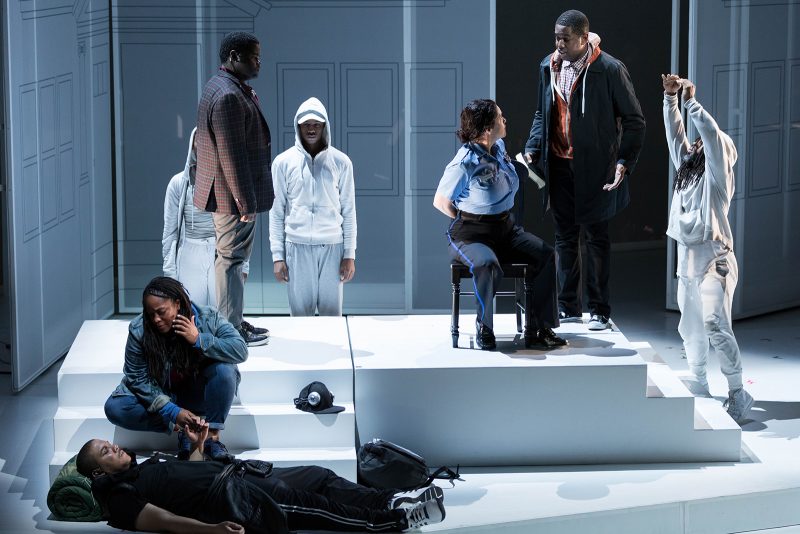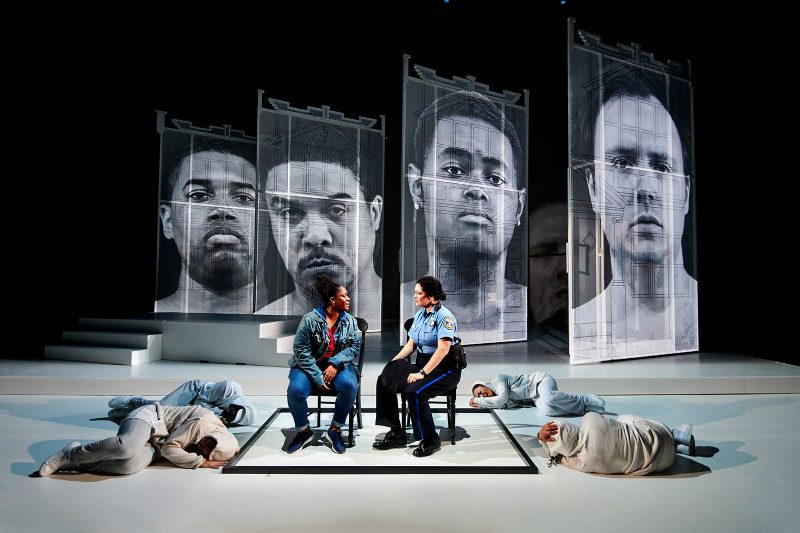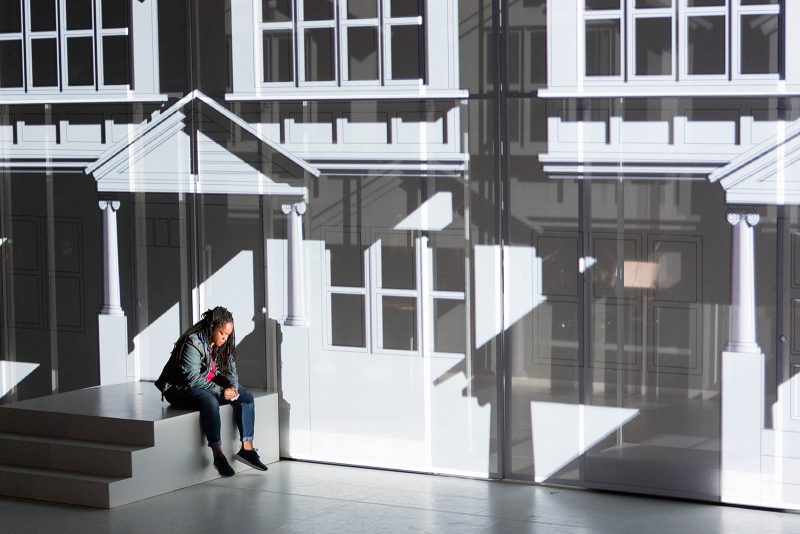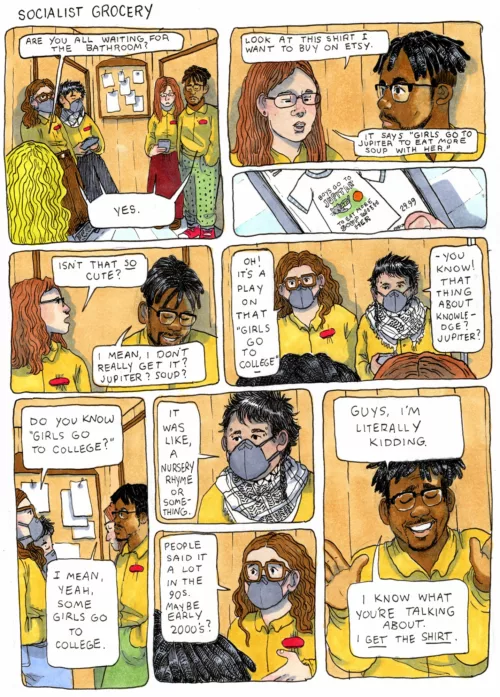(ED. NOTE: THIS POST BY IMANI ROACH WAS ORIGINALLY PUBLISHED NOV. 3, 2017)
For me, opera has always been Black. I was raised, by my grandmother, on the well-worn vinyl recordings of Leontyne Price, who during the late 1950s and 1960s became one of the very first (and certainly most acclaimed) African American vocalists to grace the stages of the Met and La Scala as a leading lady. My grandmother’s deep appreciation for and identification with Price stemmed, I believe, not only from the diva’s silvery, commanding voice, or from her groundbreaking successes as a black woman who came of age during the depression, but from her ability to embody the turmoil of the individual, battered by structures and forces far beyond her control. Opera happens at a scale that lays these forces bare for the benefit of an audience, and in the great roles of her career, from Aida to Floria Tosca to Cio-cio San, Price used her virtuosic instrument to both amplify and refuse her character’s tragic circumstances.
The question of how the dispossessed struggle against and within an unjust society, is at the very heart of We Shall Not Be Moved, a new (and truly operatic) work with words by San Francisco Bay Area poet and choreographer Marc Bamuthi Joseph. Here’s what happened, earlier this fall, when Joseph and I spoke about his very first libretto.
Imani Roach: With a makeshift family of displaced teens at the center of its story, We Shall Not Be Moved explores both the biological and chosen dimensions of kinship. Why was this important subject matter for you?
Marc Bamuthi Joseph: I’ll just focus on black people because that’s where my focus is. I think that we inevitably have an obligation to explore the mobilization of diaspora. And I think that diaspora is typically framed, especially here in the States, through the Garveyite lens of ‘let’s repatriate.’ But there are probably 12 or so black power centers around the world, from Paris to Lagos to Addis Ababa to Brooklyn to Oakland, Havana, Salvador. At some point we’re going to have to be able to build a world within a world. The dominant, hegemonic cultural structures don’t support our lives or our well-being, and have been working very effectively over centuries to inculcate that same ethos within our family structures. The systematic dismantling of the black family in particular has forced many of us to reconsider what family is. And so there are families of thought, families of circumstance, of coincidence, and I think also of cultural aspiration. You’re my family. I think this idea of a family you choose is not just some theoretical thing for many — it is a survival mechanism and a statement of purpose.

IR: I read your “OGs,” the silent, dancing characters in white hoodies who periodically haunt the main action, almost as ancestors. What is your orientation towards ghosts, and was the work at all informed by Afro-diasporic spiritual traditions?
MBJ: The spiritual traditions that I am closest to are Catholicism and Vodun. I don’t think the word ancestors is used in the piece, but that spirits walk among is a particular cosmological posture. I didn’t do a bunch of reading on the Akan or the Yoruba or anything, but what I will say is this: I have hella jobs. Yet I don’t write when my family is awake, so Most of We Shall Not Be Moved was written between 11pm and 4am. And if I had a deadline I would say: “hopefully the ghosts come tonight.”
With this piece in particular, I was also writing a piece called /Pe-LO-tah/ simultaneously — they essentially premiered within a year of each-other. /Pe-LO-tah/ is for my body and the bodies of the people on stage with me. Soccer is the curiosity and the lens through which I look at the relationship to my family. My son is 15, and the piece opens with a meditation on how, as someone who is between the ages of Tamir Rice and Trayvon Martin, he has moved from being seen as cute to being seen as a threat. That’s one kind of examination of ancestors.
In the visual semiotics of /Pe-LO-tah/ there are several teenagers and folks in their early 20s who appear wordlessly like the OGs. When I think about it, it’s kind of a tryptic, because I am also making a piece for the Brooklyn Museum that’s focused on rituals for ghosts.
IR: You’ve woven allusions to escape and revolt throughout your libretto. What connections are you drawing between the history of African enslavement in this country and more contemporary forms of state-sponsored violence?
MBJ: We have to regard the anti-historical, anti-intellectual fervor in this country. While there’s an increasingly healthy relationship to counselling and mental health here, I think this entire country has neuroses around race. We should all be in counselling, just around race. And the root of that fracture, again, in the last 700 years, is the enslavement of humans. A dominant contemporary trope for that is the relationship between black people and the police. So it’s hard to reference any engagement with the state, or the relationship between documentation and carcerality and citizenship and humanity without at the very least echoing that history.
This isn’t overtly a police state; it isn’t overtly a slave state; there’s latitude to be and to breathe and to thrive. But at the same time, there was a noose hung outside of the Brooklyn Museum yesterday [after the closing of We Wanted a Revolution: Black Radical Women, 1965-1985]. It happened in the middle of the night or early morning and was meant for folks to encounter. And this was in Brooklyn at an institution for the affirmation of black women. You have a president who not only very clearly sides with white supremacy, but who has it as his legacy as well. He is the living embodiment of the national neuroses that limits our ability to grant women and people of color even basic tenets of their humanity. When this is the climate, he’s forcing us to hopefully have more honest conversations. So all of that, Imani, just leads to “what is your responsibility as a black artist in 2017?”

IR: Towards the end of the opera, un/sung, who is your principle narrator, says something like, “I wanna live in a world where more than one thing can be true.” What were you up to there?
MBJ: Originally when un/sung says “I want to live in a world where more than one thing can be true,” I posed it as a question, and Bill [T Jones] made it a statement, dramaturgically. Originally she said “I want to live in a world where more than one thing can be true. Is that not America too?” which is a Langston Hughes reference. There are all of these references to our literary forebears, from Maya [Angelou] to Lorraine Hansberry, and there are all of these references to Langston Hughes in particular. As a dramaturg Bill was trying to make a story and I was trying to make a raft out of a story. I’m trying to make a raft headed north out of a story that can be consumed and hopefully appreciated as an opera. It is that, but I refer to it as Opera Black as F*ck. That is also what we made.
IR: You use a lot of doubled language and coded words like “spook” and “maroon” that in this context signify multiply. Can you talk about your approach to layering meaning?
MBJ: I’m not an opera librettist, I’m a poet, and I wrote a character-driven choreopoem to be performed at operatic scale. So the double meaning is a part of my aesthetic and cultural lineage, from cric-crac to folk tales to proverbs to rap. Just listening to The Roots right now [in this cafe], Black Thought is a huge influence for me. I often say that the writers I grew up on were Nikki Giovanni and Richard Wright and James Baldwin and KRS-one and Chuck D. The writers that I probably listen to the most are rappers. So my relationship to what is canonical is as much Cotton Candy on a Rainy Day as it is To Kill a Mockingbird. That’s what it means to be black and educated. Do you wanna succeed in school? Do you wanna hang out after school? OK. So all of our being here is about that double-consciousness, that monster of the double entendre.
I think specifically of a throw away line where the kids are just starting their migration and un/sung says: “we went West like a smart man with a complex.” Bill said: “What is that? Is that a Kanye West reference?,” and I was like, “yeah, but also…” Bill’s question was “why?” (As a dramaturge he is always asking, “what does it serve?”) And I was like, “the kids will get it. And it will also happen fast enough that it both will and will not matter. But for the people who get it, it will mean a lot.” There are some people who will think Manifest Destiny, as in “go West, young man,” and there are some people who will get both layers. Coding and crypting, layers, unpacking, that is also how we got free. Those things are again part of our tradition and also part of our future. They may or may not resonate for everybody, but they will energetically, and I hope intellectually, hit exactly who they are supposed to.
IR: And who is that? Who are you making this work for?
MBJ: Everybody. Black people. “I’m rooting for everybody black!” In many cases the crux of comedy, and probably the heart of culture is the insider/outsider dynamic. And there are legal, economic, land-based phenomena that we are explicitly not privy to. I think most cultural institutions — the symphonies, the operas — realize that their traditional audiences are an endangered species and that they have to revise their business model. By and large, there have been these ornamental gestures to “be more inclusive,” but here is what being more inclusive actually means: it means that we’re gonna bend borders a little bit, and maybe you’re outside of them.
IR: During intermission, an older white male critic turned to me and said: “So what happened? I mean, I know what happened on the surface, but what happened?” I took that as an acknowledgement of just what you’re saying.
MBJ: That unfamiliarity is the critical tension in this country right now, because the insider group feels like they are being pushed outside through no conscious reckoning of their own. It’s actually pretty awesome that he wanted to know. But he can never really know. Now, because there’s no Octavia Butler style telepathy, the show is still written in English. The media makes it pretty clear. It’s an opera. There are good guys and bad guys. The bad guys aren’t that bad. Is the opera for him? Sure — there’s dancing and the music is pretty.

IR: How did your experience working with young writers at Art Sanctuary inform the piece?
MBJ: The initial conception was to write with young people. There was a specific prompt for probably a quarter, maybe even a third of the poems that was something like: “what would you do if you had no fear?” But most of the responses were distressingly lacking, not just in a particular quality, but in a vision. It was very much the block and Worldstar. So I was like, what does this say about where Philadelphia is going to be in 30 years? And that distressing lack of vision is not the kids’ fault — I didn’t write with the kids, I wrote for them and also in spite of them, in spite of their situation.
I should say that the premise for the libretto was really an answer to their teachers, like: what’s up with your expectations? Because I was given many drafts [of their poetry], and you could see that the difference between the first and third draft was penmanship. When we talk about two-ness and all of these dualities of identity, this is part of the deal as well — that the bar is urgently low. So there is a relationship to young people inscribed within the work, but I would say that there is just as much of a relationship to the people who are supposed to guide them. “Who cries for the brown girl gone missing?”
IR: Somehow that tension of writing against a broken system contributes to the operatic-ness of the piece — and it is an opera in the fullest sense of the word.
MBJ: It’s an opera how we do it, I think. People have said it’s a hip-hopera, it’s a hybrid. No, it’s an opera how we get down in 2017. It’s two kids of immigrants who grew up around hip-hop, and dated certain kinds of women, and did certain kinds of drugs, and read certain kinds of books, and hung out in certain kinds of places. It’s how we do it; it’s fathers.
IR: But what level of reverence or consideration did you have for the form?
MBJ: One of the many things that we have to fight for is honesty with ourselves within the context of conventional form. Because many of us, whether it’s running a company or creating an opera, think: “well, I have to do it the way he would do it. I got hired, but if I do it the way I do it they are going to freak out.” But that’s not how we’ve ever succeeded. Obama presidented the way only he could. The way that Alicia [Garza] and Patrisse [Cullors] and them organize, is very poetic. The intersectional poetics of their resistance is us. So reverence for the form? Respect for the form. Respect for the form, reverence for black people.
“We Shall Not Be Moved” will screen free in HD on Saturday September 29th as a part of Opera Philadelphia’s 8th annual Opera on the Mall broadcast. Visit here for tickets and more info.
“We Shall Not Be Moved” originally ran in Philadelphia at the Wilma September 16th-24th, 2017, and in New York City at the Apollo Theater October 6th-7th. “We Shall Not be Moved” was developed through a creative partnership between Opera Philadelphia and Art Sanctuary, and presented in partnership with FringeArts as part of the 2017 Fringe Festival.
To follow Bamuthi’s current and upcoming projects, find him on twitter (@bamuhti) and tumblr.
(ED. NOTE: This post by Anna Marie Gibertini originally published on Artblog Nov. 3, 2017)





